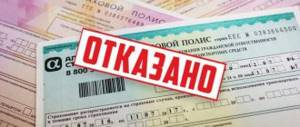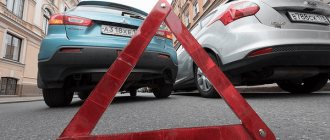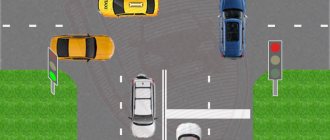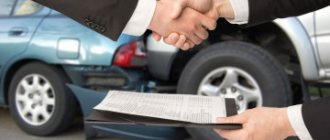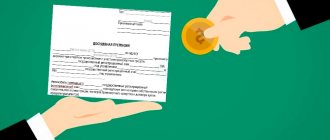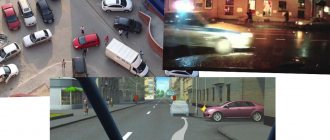Should I contact a car lawyer?
This question cannot be answered unequivocally. But with a high degree of probability it is worth it. The fact is that judicial and pre-trial processes always contain a large number of procedural actions, errors in which are worth the lack of certain evidence. And insurance companies have their own lawyers.
However, the procedure to follow if the insurance company refuses to pay or repair is not so complicated. It’s just that there are non-standard situations in the form of unpopular grounds for refusals (for example, an unobvious third party to an accident, an unobvious guilt of a person).
Your representative will always evaluate the prognosis of the case before proceeding with it and charging you for payment.
You can contact an auto lawyer absolutely free of charge, and he will be able to advise you specifically on your insured event!
Important! Didn't receive an answer to your question? Our expert lawyers work for you. It's absolutely free!
- Only practicing traffic lawyers
- Anonymously
- For free
or call toll free number 8
✖
What nuances should you pay attention to when contacting a car lawyer when the insurance company has refused to pay under compulsory motor liability insurance:
- a competent auto insurance lawyer will always study the case at the stage of getting to know you before concluding a contract; if the representative immediately proposes to conclude an agreement, then this is the “wrong lawyer”,
- not all lawyers are equally useful; study the experience and number of cases won by an auto lawyer specifically regarding insurance refusals; you can do this simply by searching by the name of the representative on the websites rospravosudie.com and sudact.ru,
- prices for the services of auto lawyers for refusals of insurance companies to pay or repair vary greatly: on average from 4-5 thousand rubles to 12-15 thousand; in such cases it is also often customary to give “prizes” - a certain payment if the case is won upon its completion.
When conducting business, you will need to conclude an agreement with your representative, pay an advance payment or the full amount at once and write out a power of attorney (power of attorney form below), which can be certified by your employer or notarized.
If the culprit fled the scene of the accident
Does the insurer have the right to refuse payment under compulsory motor liability insurance in this case? No, this cannot be the reason for refusal of compensation under the “automobile civil law”. But only under one condition: if the culprit is found and his car is insured under MTPL.
The insurer compensates for damage caused by the fault of its client, and if it is not known who is at fault, there will be no compensation from the insurance company.
If the culprit is not found, there is no trial. The only thing is that RSA will pay for damage to health. If they find it, but there is no policy, you need to demand money from him through the court. For health benefits, again at the RSA. If they find it and have a policy, the culprit’s insurance company pays.
When is denial of insurance payment legal?
So, your motor third-party liability is insured under OSAGO. This means that you are insured against fault in an accident - the insurance company will compensate for the damage on your behalf if you are the culprit of the accident.
Part 25 of Article 25 of the Federal Law “On Compulsory Motor Liability Insurance” gives the insurer the right to refuse such compensation in cases provided for by law. Let's look at cases where the insurance company's refusal to pay is based on the law.
If you have an incomplete set of documents regarding an accident
We have already discussed in a separate article how to correctly submit a complete list of documents. It depends on whether the accident caused damage only to property or to the health and life of people.
If the package of documents is incomplete, then the insurance company has the right to legally refuse repairs or payment.
If you do not provide the car for inspection by the insurance company
This risk for the driver often appears when applying for a European protocol. The point here is that both in cases where the accident was registered with the help of it, and if without it, the driver is obliged not to begin repairing the car and not to dispose of it (or what’s left of the car) within 15 calendar days and request from the insurance company to provide the vehicle for inspection within this period.
If this is not done, there will be a refusal of insurance payment or repair, and it will be legal.
Free consultation with a traffic lawyer: 8 (Moscow and region), 8 (all of Russia - free call)
What to do if you refuse?
The subtlety of the auto law here is that, according to Part 20 of Art. 12 of the Federal Law “On Compulsory Motor Liability Insurance” (here and below this law will be implied), simply the fact of repairing a car or its disposal does not immediately cause a refusal. The latter is possible only if such an action by the car owner does not allow one to establish the very fact of the existence of an insured event or to estimate the amount of compensation from the insurance company.
But this also does not mean that you can simply immediately do an independent examination and, based on its results, apply for payment. As practice shows, in this case you will also receive a refusal, and judicial practice in 2021 and previous years supports the trend - if you do an independent examination and repair the car without inspecting the insurer, then the judges will support the insurance company’s decision to refuse to pay you.
As you can see, proving the opposite is a rather complicated procedure due to ambiguous judicial practice. Therefore, in this case, it is best to contact a car lawyer to assess the prospects of such a case.
If the insurance company did not satisfy your claim for compensation, demanding that you bring them a car, but it is not driving, and you stated this directly to the insurance company, then the refusal as of 2021 will be unlawful. Even if the car is not running, it was not the result of an accident. And, for example, due to a broken wheel and lack of a spare wheel. You don’t have to give a reason for this at all, but simply report that the car is not running.
In the latter case, read below for instructions on asserting your rights in the event of refusal of payment or repair due to failure to present the car.
If the OSAGO policy is fake
Obviously, when the policy of the culprit turns out to be fake, the insurance company is not obliged to pay compensation for the accident to the victim, and in this case, you will also have to apply for compensation from the culprit. But fake insurance does not always lead to refusal. We discussed such cases and what to do in such cases separately in the article about a fake OSAGO policy.
If the insurance company is bankrupt
Then you will have to contact the Russian Union of Auto Insurers, which already insures the insurance companies themselves against bankruptcy.
The procedure for contacting this body is similar to applying to the insurance company with the same set of documents. The only difference is that refusal from RSA is much less likely than from insurance, and also no repairs - only payment in money. Instructions for applying in this case are on the official website of the RSA.
If you contacted the wrong insurance company
The insurance company refuses to pay if you apply to the wrong address. The fact is that the law clearly regulates when you need to contact your insurance company, and when - only to the insurer of the culprit.
So, you need to contact the company where you took out your MTPL policy when:
- damage was caused only to cars or other property, but there were no injuries or deaths,
- all participants in the accident have a valid MTPL policy.
If you require compensation for damage not covered by MTPL
The auto insurance policy does not insure all the driver’s risks, but only the main ones. There are a number of exceptions when the insurance company can legitimately refuse to pay or repair, and the instructions in this case simply will not help.
So, the insurance refusal is legal in the following cases:
- You have applied for compensation for moral damages from an accident,
- You have applied for compensation for lost profits, compensation for lost working hours,
- at the time of the accident, the car was participating in competitions or conducting training driving,
- You are seeking compensation for damage caused to the environment or rare or unique objects, as well as if cash, jewelry, shares and copyrights were destroyed as a result of the accident.
All these points are regulated by Article 6 of our law.
Reasons for which refusal is illegal
Many insurance companies are trying by all means to evade the due compensation. Most often, the IC tries to apply the following illegal grounds:
- The driver's name was not included in the insurance; the required funds can be collected, but the insurance company will subsequently try to file a claim for compensation.
- If the fact that the culprit is in a state of intoxication is revealed, the insurance company is obliged to compensate for the damage, and only then demand a refund.
- The culprit fled the scene of the accident and was not identified; the victim must receive payment regardless of this fact.
- The culprit does not consider himself guilty and files a corresponding complaint - until this complaint is considered and approved, the policyholder can claim compensation.
- A person who is not the owner of the damaged vehicle applied for payment - any citizen who has a power of attorney from the direct owner of the car can apply for payment.
- Due to the lack of technical inspection, for the case to be considered, it is enough to conduct an examination, and not a full technical inspection.
- Traceology showed that the damage was not sustained during the accident in question.
- The culprit hid from going to the Investigative Committee and did not bring the car for inspection - this is not a legal basis for refusal, since the victim is not to blame for this.
- The accident occurred due to the absence of a spike sign.
- The driver does not have a license to drive a car, was intoxicated, and was not included in the compulsory motor liability insurance.
If the insurance company refuses on one of these grounds, then the victim can safely appeal this decision and claim payment. Any wording of the IC should be treated with special attention.
When does the insurance company have no right to refuse payment?
Meanwhile, a large number of cases cannot be the basis for the insurer to refuse compensation for damages. Such cases include:
- Missing the deadline for reporting, including when registering an accident under the European protocol,
- refusal of the insurance company to go to a car that is not running, and this is indicated in the application for payment,
- if the OSAGO policy is fake, but the form itself belongs to the insurer (more details in the article),
- if the injured driver was drunk, refused to testify and committed any other violations that do not affect his guilt in the accident,
- if you do not have MTPL insurance, in this case you just need to contact the company at fault,
- if the insurance company requires documents that are not on the mandatory list, and you did not provide them,
- You or the culprit do not have a diagnostic card,
For what reasons does the insurance company not have the right to refuse?
In the following non-standard cases, the insurer still cannot refuse payment, no matter how serious the reasons may seem:
- the guilty party intentionally caused harm to life and/or health;
- the culprit was drunk (including on drugs, etc.)
- the culprit does not have a driving license
- the person who caused the damage fled the scene of the accident (but was later found);
- who was driving the car that caused the damage is not registered in the insurance
- The accident occurred during a period (second column of the form) not covered by insurance ;
- the culprit did not provide his insurer with his part of the notification form in due time (if the accident was registered without Traffic Inspectorate employees);
- the person who caused the accident did not provide his car for examination;
- the person who caused the accident restored or disposed of his car before the end of 15 days after the accident (if registered under the European protocol);
- the culprit does not have a valid diagnostic card;
- the electronic policy of the culprit contains incorrect data indicated by him in order to save on the insurance premium;
- documents not required in a particular case were not provided;
- the accident occurred due to a malfunction that was not indicated in the diagnostic card, although it was possible to identify it during a technical inspection
- The insurer's license has been revoked.
Contacting the insurance company - step-by-step instructions
So, what to do if an insured event occurs? In fact, the procedure is simple:
1. You need to collect all the documents regarding the accident, fill out a notice and write an application for insurance payment.
2. Next, you need to either take these documents personally to the insurance company, but then demand an act of acceptance of documents (which, in fact, they are not required to give you), and film the process of submitting documents one by one on video.
But it is better to send a set of documents by registered mail with acknowledgment of receipt, and keep the receipt and notification. Next, when the letter is received by the insurance company, you will receive a notification of delivery - you also need to keep it, and also remember the date of delivery - the countdown of the compensation period begins from there.
3. Now you need to wait 20 calendar days (this does not include days that are officially considered non-working holidays) for payment or referral for repairs. Also, from the date of receipt of the letter with the documents or handing them over to you personally in the office, the insurance company has 5 days to inspect the car.
4. Based on the results of this period, there are 3 possible outcomes of events:
- You will receive payment or a referral for repairs within 20 days (or a little later),
- You will receive a reasoned refusal to pay or repair from the insurance company,
- the insurance company will not react in any way - there will be no refusal or compensation for damage.
The last point, in fact, is tantamount to refusal. We will consider below what to do in each such case.
How to file a claim against an insurance company
According to compulsory motor vehicle insurance, every driver must insure the car and liability. But after contacting your insurance company, as well as the at-fault policyholder, and receiving a refusal, you will need special documents and statements.
These documents are necessary to challenge the decision to refuse payment. The car owner has the right to file a complaint with the Central Bank of the Russian Federation and the RSA, as well as with the court. The first two organizations allow you to make an application online and by letter sent by regular mail.
Having chosen where to complain, be aware that before filing a claim for consideration in court, you must file a complaint against the insurance company, to which it did not respond properly within 5 days. The claim describes the circumstances of the incident and the reasons for the failure of the insurance company.
We receive a refusal and evaluate the prospects
So, if you have failed and you are faced with one of the last 2 items in the list above, then you should not despair. The insurance company’s refusal may not be a failure at all, but an additional “bonus” if the case is won, which can result in amounts exceeding the cost of compensation for damage from an accident.
What are these “bonuses”? We will look at them in detail below, but here is a short list:
- the actual amount of damage will be assessed by an independent organization, which means that it will not be underestimated or less underestimated (due to the calculation method taking into account wear and tear),
- after 20 days of the period for compensation, the insurance company pays 1% for each day of delay of the amount of damage,
- in case of refusal to pre-trial settlement of the dispute, the insurer is entitled to a fine of 50% of the amount of payment in favor of the plaintiff,
- It is often possible to recover a small amount of moral damages .
And all this without taking into account the fact that if you win the refusal, the insurance company will reimburse you for all current expenses, including a car lawyer, examination, forwarding mail, telegrams and others, if any.
As we understand, the main thing we need is to win the trial. And for this we need to understand on the basis of what we were refused. There can be a lot of reasons.
And it is at this stage that we recommend consulting with a competent auto lawyer, who may not take the case upon himself, but will be able to assess your risks and chances of proving you are right.
Let's sue the insurance company - step-by-step instructions (+ pre-trial claim)
So, we received a refusal from the insurance company to compensate for the damage, and the question arises of what to do next. We will break down the answer to this question into 3 important steps:
- independent examination,
- pre-trial settlement of the issue,
- filing a lawsuit for refusal.
Independent examination
It is done for a financial assessment of the damage - in order to file a claim with the insurance company, we need to know the amount of money that we want to recover. It may not be required if the insurance company itself assessed the damage and issued you an assessment or examination report with a known amount of damage. But it may also be underestimated.
It is impossible to independently conduct such an examination by simply monitoring prices and compiling a table of them - neither the insurance company nor the court will accept such a calculation.
Carrying out an independent examination is paid and costs on average from 5 to 15 thousand rubles, depending on the degree of damage and the pricing of the office itself. These expenses are reimbursed if the case is won.
- To do this, simply contact an independent expert who will do everything himself.
- The expert will set a date and time for the examination; it should be no earlier than 5 days after your application. After this, you need to send a telegram to the legal address of the insurance company and invite its representative for an examination no earlier than just these very 5 days. This is an optional procedure, but the courts evaluate this point in a positive way for you. Most often, in practice, insurance representatives do not come.
- Based on the results of the examination, you should be given a check, a copy of the contract for its implementation and, most importantly, an expert opinion with a table of prices for spare parts and labor, photographs of damage and the total amount to be reimbursed. All these 3 documents are important and you will need them in the future. Ask for a duplicate of the expert report, and also take a flash drive or other electronic media with you and ask to upload a photo of the examination to it - you will also need all this.
The calculation is made taking into account wear, alas. Depreciation can be no more than 50% for cars older than 5 years. But it is considered only for spare parts and components. Work must be calculated without taking into account wear and tear.
Also, if the car is not older than 5 years, then an expert at your request (you must ask to do this) can separately calculate the loss of marketable value (LCV) of the car. This is compensation for the fact of the accident itself, because when sold in the future, due to the presence of an accident in the history, your car will cost less on the secondary market.
The TLC is usually about 8-10% of the damage amount.
Pre-trial claim
This is an important step in the dispute with the insurance company and should not be skipped. The case of an insurance company’s refusal to repair or pay is a matter of consumer protection law, and a mandatory attempt at pre-trial settlement of the dispute is required.
For pre-trial settlement you will need the following documents:
- original independent expert report,
- all checks to substantiate the amounts indicated in the claim,
- all the same documents that you submitted when contacting the insurance company, as a result of which the insurance company refused payment and repairs.
How to write a pre-trial claim?
In fact, there is nothing complicated here. You need to describe the nature of the accident, why you contacted the insurance company, on the basis of which you consider the insurance company to be wrong in refusing compensation for damage, and what exactly you are demanding.
There is no approved official form for this document; you write it in free form.
We provide all this data with links to the legislation in force for 2021 in a sample. (DOC format for filling out on a computer).
Next, the claim must be sent by registered mail with return receipt requested to the legal address of the insurer that refused to pay you or make repairs. After the date of delivery, the insurance company has 10 days (indicated in the claim form, it can be increased) to satisfy the “pre-trial”, after which you can file a claim in court.
Something else useful for you:
- Collecting payment without depreciation under compulsory motor liability insurance from the culprit - is it legal and what to do?
- If the person at fault for an accident does not have compulsory motor liability insurance, what to do and how to recover damages?
- Mutual fault under compulsory motor liability insurance - how is payment made?
Lawsuit
So, if the insurance company did not satisfy the pre-trial demand, but refused to pay or send it for repairs, then our next action is to file a claim in court.
There is nothing complicated here either. Since the refusal of an insurance company is a matter falling under the Law on the Protection of Consumer Rights, you can sue the insurer in the city or district court at the place of registration of the plaintiff - that is, at your registered address. The most convenient way to do this is here. Select your region of residence, enter your registration address, and the search service will find the correct court.
Now you need to correctly draw up a statement of claim, indicating all the necessary data with references to the laws on the basis of which you specifically demand from the defendant. The statement of claim does not have an approved form to fill out, but it is important to write it correctly. You can also entrust this matter separately to a car lawyer.
.
Next, this claim must be taken and handed over to the office, having received an incoming number and wait for the subpoena. You, the insurance company that refused to send for repairs or payment, as well as the third party who caused the accident will be called. Depending on the region of residence and the specific court, you will have to wait from 3 weeks to 3-4 months. Alas, the courts cannot cope with the flow of people wishing to sue for insurance compensation and other disputes.
Independent assessment of insurance compensation
An important aspect in insurance payments: You have the right to conduct an independent assessment of damage and the cost of restoration repairs. At the same time, it is worth remembering that the assessment must be ordered from an assessment organization, whose specialists must have certain knowledge and skills, which must be confirmed by relevant certificates. If the insurance company does not pay, our specialist will help you organize everything.
- It is important when conducting an independent examination on your own, be sure to notify the insurance company of the place and time of the inspection of your car so that the insurance company can send its representative. The powers of the representative must be formalized accordingly.
- After the inspection has been carried out and you have received an expert opinion, you must submit a written claim with an attachment - a copy of the independent examination report. The insurance company is obliged to pay money in accordance with the independent examination report within 10 days from the date of receipt of your claim.
- If there is no payment after the claim, you have the right to file a claim in court. The specialists of our Law Office have extensive experience in collecting insurance compensation from insurance companies. We will be happy to help you.
How does the court proceed when a payment is refused?
On the appointed day and time specified in the summons, you come to the court, to the office also specified in the summons. Don't be surprised if you're the only one in court. Often the insurance company ignores attending court, although it depends on the insurance company (for example, representatives of Rosgosstrakh often come to court).
However, most likely, the insurance company will file objections as well as motions in court. They may contain:
- a request to conduct a forensic examination with an objection either to the existence of the fact of an accident or to the amount indicated in the examination report,
- objection regarding the guilt of the second participant in the accident.
Most often, the court grants requests for an examination. But what’s even worse is that it’s paid. It is initiated by the insurance company, but subsequently the costs fall on the losing party. If the amount of the claim is reduced as a result of a forensic examination, for example, by 25%, then 25% of the payment for the examination itself will fall on the plaintiff - that is, on you, and 75% - on the insurance company.
There is just one subtlety - the cost of a forensic examination, as a rule, greatly exceeds the prices of independent appraisers. On average, a forensic examination costs from 20 to 50 thousand rubles.
What questions will I be asked?
By the way, you don’t have to come to court at all, but this slightly increases the chances of getting your claim rejected under compulsory motor third party liability insurance. Therefore, it is better to attend the trial.
You may be asked for the following information:
- tell the circumstances of the accident,
- could you have prevented the accident,
- about the nature of the accident and damage.
Don’t worry, the judge is unlikely to “load” you, but he needs to find out all the circumstances of the case about the insurance refusal, so it is important to tell the truth, concisely, but without missing important facts.
If a forensic examination is ordered
Alas, but then you will have to wait again. The case will be postponed and a forensic examination (traceological or conventional) will be ordered. According to the law, the decision on its implementation comes into force only after 15 days. Therefore, only after this period will movement on the issue begin.
An expert will contact you and ask you to drive to the specified address, or he will come himself if the car is not moving. If you have already repaired or sold the car, then the examination will be carried out using photographs. It will be better if you save electronic versions of the photos. It’s even better if the car still hasn’t been repaired. Otherwise, the expert may point out the impossibility of determining the fact that the damage was received as a result of this particular accident, and the court may refuse the claim.
After the examination, the amount of payment will be decided. Yes, now we have bad news for you! Most likely, the judge will reduce the amount of the fine and penalty. Article 333 of the Civil Code of the Russian Federation gives him the basis to do this. It happens that the size of the penalty is reduced tens of times.
The lawsuits have been won - what to do next?
When your claims are satisfied, the insurance company will be obliged to transfer the amount specified in the decision to your account. But all this after the court decision entered into legal force, of course. To do this, the court issues a writ of execution, which is sent directly to the insurance company.
If the insurance company does not pay for it for a long time, then the writ of execution is sent to the bailiffs, and they can already write off the necessary amount from the defendant’s accounts in your favor.
Judicial practice regarding insurance refusals
The most convenient way to familiarize yourself with the full judicial practice in civil cases on issues where the insurance company has refused to pay and repair is on the website of Judicial and regulatory acts of the Russian Federation. Go to the page of litigation regarding insurance refusals.
There is a convenient filter where you can select applicable laws and articles or clauses of laws, or use the search to find solutions similar to your insurance refusal.
You can also search for the judge's last name to find his specific court decisions. You will find out the name of the judge at the step after submitting the statement of claim to the court.
Here are examples of several court decisions on insurance company refusals:
- refusal to satisfy a claim against the insurance company due to lack of evidence of an accident,
- a significant reduction in the insurance payment by the judge in the form of penalties and fines, and one more thing,
- Satisfaction of a claim regarding the insurance company's refusal to pay.
